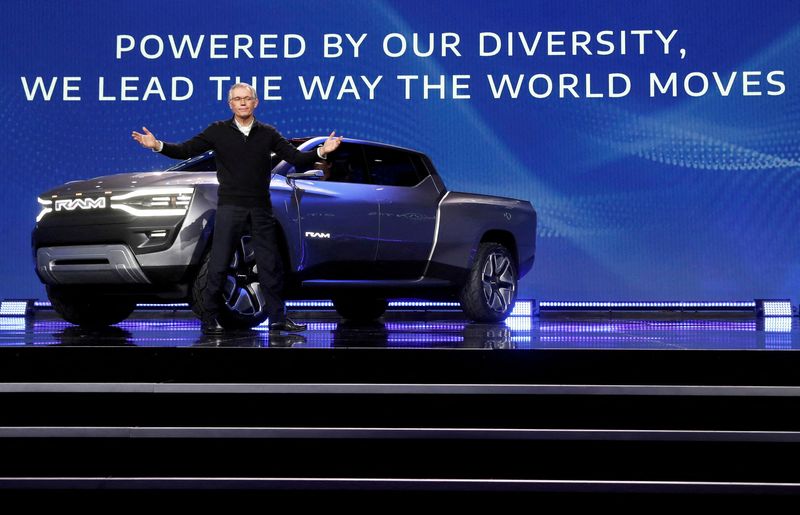By Joseph White and Christoph Steitz
MUNICH (Reuters) -Stellantis expects a major battle with Chinese rivals in the European market for electric vehicles, warning of significant consequences for jobs and production as a result, the group's Chief Executive Carlos Tavares said on Wednesday.
The comments in an interview with Reuters are among the CEO's most strongly worded yet as tensions among Beijing, Brussels and Washington over EV trade grow. The EU is expected to decide next month on whether to follow the U.S. in imposing additional tariffs on Chinese carmakers.
U.S. officials said Wednesday they plan to hit Chinese made EVs and EV materials with duties up to 100% by Aug. 1.
Tavares said tariffs on Chinese vehicles imported to Europe and the United States are "a major trap for the countries that go on that path" and will not allow Western automakers to avoid restructuring to meet the challenge from lower cost Chinese manufacturers.
The European Commission will unveil an initial decision on potential tariffs on Chinese EV imports on June 5. China has been threatening counter tariffs.
"When you fight against the competition to absorb 30% of cost competitiveness edge in favour of the Chinese, there are social consequences. But the governments, the governments of Europe, they don't want to face that reality right now," Tavares said.
Tavares said that tariffs would only fuel inflation in the regions where they are imposed, potentially impacting sales and production.
"We are not talking about a Darwinian period, we are in it," Tavares said at a Reuters Events Automotive Europe conference in Munich, adding the price battle with Asian rivals would be "very tough".
"This is not going to be easy for the dealers. It's not going to be easy for the suppliers. It's not going to be easy for the OEMs. As we know in Europe, everybody is talking about change as long as change is for somebody else."
Italy's nationalist government has been pressing Stellantis (NYSE:STLA) to commit to building 1 million vehicles a year in the country, up from 750,000 last year. Tavares did not respond specifically to a question about Italy's demand, but outlined the overcapacity looming over the European auto sector.
Chinese automakers are already on track to sell 1.5 million vehicles in Europe, equivalent to a 10% market share and up to 10 assembly plants worth of production, Tavares said.
"If we let the share of the Chinese OEMs grow ... then it's obvious that you are going to create an overcapacity, unless you fight against that competition," Tavares said.
Tavares said Stellantis is in "very rewarding discussions" with labour unions at its European operations: "Most of the time they agree with us in terms of what is the risk that we are facing and how we should go through that period."
Stellantis last week announced it would start selling EVs of its Leapmotor (HK:9863) Chinese partner outside China during this year, starting form Europe in September.

The Stellantis-Leapmotor joint venture, the first one between a Western and a Chinese carmaker designed to sell and produce EVs from a Chinese manufacturer outside China, will help the Franco-Italian group expand its global offerings of budget vehicles.
"We will try to be Chinese ourselves, which means instead of being purely defensive vis-à-vis the Chinese offensive, we want to be part of the Chinese offensive," Tavares said.